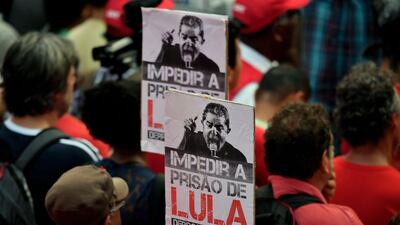An appellate court on Wednesday delivered a significant blow to Brazil’s ex-president Luiz Inacio Lula da Silva, unanimously upholding a graft conviction against him and even adding years to his prison sentence in a major decision that could keep the former leader from running for a third term despite holding a lead in the polls.
The ruling was the latest legal setback for da Silva, who was wildly popular as president between 2003 and 2010 but has since been dogged by several corruption allegations amid a mushrooming graft scandal that has taken down top politicians and businessmen in Latin America’s largest nation.
While da Silva, 72, has several avenues to still get on the ballot for October's election – and his lawyers have indicated they will appeal any setback – the decision further complicates a political comeback. Many argue that sidelining him could anger millions of his supporters and impact the country’s political stability.
After hearing arguments in the morning from the prosecution and defence, Judge Joao Pedro Gebran Neto was the first to vote. He went beyond the original conviction, saying that jail time should be 12 years and one month, an increase of more than two years from the sentence levelled in July.
“I consider the culpability in the case extremely high,” said Mr Gebran Neto. “This is about a former president and a corruption scheme that prevailed for years.”
The following two judges agreed on all counts.
“Nobody can be absolved just because he’s powerful,” said Judge Leandro Paulen, referring to da Silva’s large following.
"The evidence has stood up to criticism, confrontation and counterpoint," said Judge Victor dos Santos Laus. "The accusation is proven."
Despite myriad legal troubles – beyond this conviction da Silva is facing charges in six other cases – he leads preference polls for October's race.
With tensions high, authorities closed streets around the court in the southern city of Porto Alegre on Wednesday as the case opened. Helicopters hovered above, police patrolled on horses and sharpshooters were positioned on rooftops.
The case was so closely watched that in the afternoon Brazil took over much of Twitter: three of the top 10 topics trending worldwide were about the case.
The top trending topic was the hashtag #MoluscoNaCadeia or "MolluskInJail". That was a play on the fact that da Silva is universally known as Lula, which is a common nickname for Luiz but also means "squid" in Portuguese.
In this deeply polarised, continent-sized nation, the case is part of a larger narrative, with supporters and detractors of da Silva offering their own interpretations. Da Silva and his supporters say it and the other corruption cases are an attempt to keep him from returning to office. They argue it’s part of a conspiracy: the nation’s elite do not want a president who would focus on the poor and equal the playing field in one of the world’s most unequal nations.
Detractors note that da Silva and his left-leaning Workers’ Party were running the country while a massive corruption scheme siphoned billions from state oil company Petrobras and helped Latin America’s largest economy fall into its worst recession in decades.
Over the last several years, the so-called "Car Wash" corruption probe has landed dozens of the nation's elite, from businessmen to politicians, in jail. Several construction companies formed a de facto cartel, which decided who would get inflated contracts that included billions of dollars in bribes and kickbacks to politicians, company officials and parties in the form of campaign contributions.

